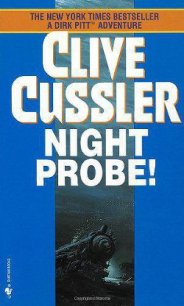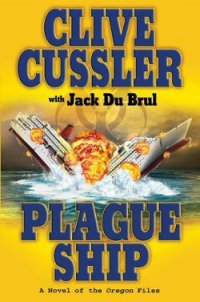Flood Tide - Cussler Clive (читать книги без txt) 📗
“We'll be inconspicous when we're under the keel,” Giordino added. “It's when we're inspecting the hull on the sides below the waterline that we're vulnerable to detection from above.”
“What about the darkness caused by the shadow of the hull?” asked Cabrillo. “What if underwater visibility is lousy? What then?”
“We'd have to rely on artificial lighting, but it would be imperceptible to anyone staring over the side of the dock with sun over their head.”
Cabrillo nodded. “I understand your dilemma. Romantic adventure novels say it's darkest before dawn. We'll drop you and your submersible over the side and tow you within spitting distance of the United States, putting you on station before sunup.”
“Sounds good to me,” Pitt said gratefully.
“Can I ask you a question, Mr. Chairman?” inquired Giordino.
“Go right ahead.”
“If you carry no cargo, how do you justify entering and exiting a port?”
Cabrillo gave Giordino a canny look. “The empty wooden crates you see on the deck and the ones in the cargo holds above our concealed cabins and galley are stage props. They will be off-loaded onto the dock, then consigned to an agent who works for me and transported to a warehouse. After a proper length of time, the crates are re-marked with different descriptions, returned to the dock and loaded back on board. As far as the Chinese are concerned, we dumped one cargo and took on another.”
“Your operation never ceases to amaze,” said Pitt.
“You were given a tour of our computer compartment in the bow of the ship,” said Cabrillo. “So you know that ninety percent of the Oregon's operation is under the command of computer-automated systems. We go manual when entering and departing a port.”
Pitt handed the binoculars to Cabrillo. “You're an old pro at stealth and covert activities. Doesn't it strike you odd that Qin Shang is converting the United States into a first-class smugglers' transport right out in the open under the eyes of anyone looking on? Crewmen on cargo ships, passengers on ferries and tour boats?”
“It does seem peculiar,” Cabrillo admitted. He lowered the glasses momentarily in thought, puffed on his pipe, and peered through the lenses again. “It's also peculiar that all work on the ship appears to have stopped. No sign of tight security either.”
“Tell you anything?” asked Giordino.
“It either tells Qin Shang is uncommonly careless or our renowned intelligence agencies have been outsmarted by him,” said Cabrillo quietly.
“We'll know better after we check out the ship's bottom,” said Pitt. “If he intends to smuggle illegal aliens into foreign countries under the noses of their immigration officials, he'd have to have a technique for removing them off the ship undetected. That can only mean some kind of watertight passage beneath the waterline to shore or even possibly a submarine.”
Cabrillo tapped his pipe on the rail, watching as the ashes spiraled down into the harbor. Then he looked thoughtfully across the water at the former pride of America's passenger fleet, her superstructure and two rakish funnels brilliantly lit like a movie set. When he spoke it was slowly and solemnly. “You fully realize, I assume, that if something should go wrong, a minor mishap, an overlooked detail, and you are caught in what is considered an act of espionage by the People's Republic of China, you will be treated accordingly.”
“Like being tortured and shot,” said Giordino.
Cabrillo nodded. “And without anyone in our government so much as lifting then” little finger to stop the execution."
“Al and I are fully aware of the consequences,” said Pitt. “But you're placed in the hazardous position of risking your entire crew and your ship. I wouldn't fault you for a second if you wanted to toss us in the bay and steam off into the sunset”
Cabrillo stared at him and smiled craftily. “Are you serious? Skip out on you? I'd never consider it. Certainly not for the enormous sum of money a certain secret government fund is paying me and the crew. As far as I'm concerned, this has far less risk than robbing a bank.”
“In excess of seven figures?” Pitt asked.
“More like eight,” replied Cabrillo, suggesting a fee of over ten million dollars.
Giordino looked over at Pitt sadly. “When I think of what our pitiful monthly stipend from NUMA adds up to, I can't help wondering where we went wrong.”
UNDER THE COVER OF PREDAWN DARKNESS, THE SUBMERSIBLE Sea Dog II, with Pitt and Giordino inside, was lifted from her crate by the loading crane, swung over the side of the ship and slowly lowered into the water. A crewman standing on top of the submersible unhooked the cable and was hauled back on board. Then the Oregon's shore launch pulled alongside and attached a towline. Giordino stood in the open hatch that was raised three feet above the water while Pitt continued ticking off the instrument and equipment checklist.
“Ready when you are,” announced Max Hanley from the launch.
“We'll descend to ten feet,” said Giordino. “When we reach that level you can get under way.” “Understood.”
Giordino closed the hatch and stretched out beside Pitt in the submersible, which had the appearance of a fat Siamese cigar with stubby wings on each side that curved to vertical on the tips. The twenty-foot long, eight-foot wide, 3,200-pound vehicle may have looked ungainly on the surface, but underwater she dived and turned with the grace of a baby whale. She was propelled with three thrusters in the twin tail section that
impelled water through the front intake and expelled it out the rear. With a light touch on the two handgrips, one controlling pitch and dive, the other banks and turns, along with the speed-control lever, the Sea Dog II could glide smoothly a few feet under the surface of the sea or dive to a depth of two thousand feet in a matter of minutes. The pilots, who lay prone with their heads and shoulders extending into a single transparent glass bow, had a much wider range of visibility than provided by most submersibles with only small viewing ports.
Visibility beneath the surface was nil. The water enclosed the sub like a thick quilt. Looking up and ahead, they could just barely make out the shadowy outline of the launch. Then came a deep rumble as Cabrillo increased the rpms of the powerful Rodeck 539-cubic-inch, 1,500-horsepower engine that drove the big double-ender launch. The propeller thrashed the water, the stern dug in and the launch strained before surging forward with the bulky submersible in tow. Like a diesel locomotive pulling a long train up a grade, the launch struggled to gain momentum, finally increasing its speed until it was dragging the deadweight below the water at a respectable eight knots. Unknown to Pitt and Giordino, Cabrillo had the throttle of the powerful engine set at only one-third power.
During the short journey from the Oregon to the United States, Pitt programmed the on-board computer analyzer that automatically set and monitored the oxygen level, electronics and the depth control systems. Giordino activated the manipulator arm by running it through a series of exercises.
“Is the communications antenna up?” Pitt asked him.
Lying next to him, Giordino nodded slightly. “I let out the cable to a maximum length of sixty feet as soon as we entered the water. She's dragging on the surface behind us.”
“How did you disguise it?”
Giordino shrugged. “Another cunning ploy of the great Albert Giordino. I encased it in a hollowed-out cantaloupe.”
“Stolen from the chef, no doubt.”
Giordino gave Pitt a hurt look. “Waste not, want not. It was overripe and she was going to throw it in her garbage collector.”
Pitt spoke into a tiny microphone. “Chairman Cabrillo, do you read me?”
“Like you were sitting next to me, Mr. Pitt,” Cabrillo came back quickly. Like the other five men in the launch, he was dressed as a local fisherman.




